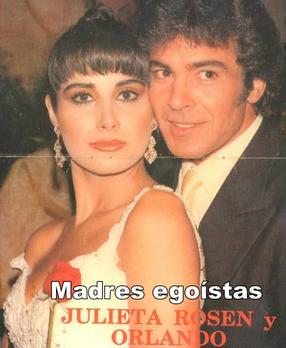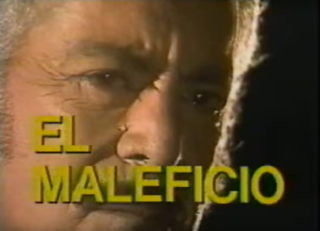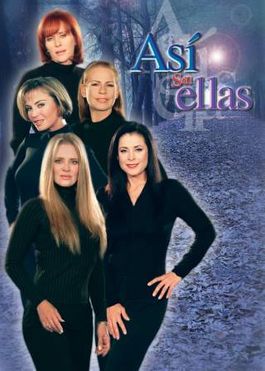Synopsis
María is a hard-working and honest young woman who provides her services at a pharmaceutical company called Balmori Laboratories. Unfortunately, she is forced to quit her job because her boss, Adolfo Klein, attempted to rape her.
After the incident, María gets a job at the prestigious factory of Jaime Dumas, a businessman connected to the mafia. He is Adolfo's relative and partner. When Jaime's father died he left his entire inheritance to his wife Sara and she left Jaime in charge to take care of the factory, since he is the eldest son.
Alicia, Jaime's sister, is Adolfo's wife. Rebeca is Jaime's wife, and when she finds out that Adolfo tried to rape María, a terrible scandal is created around the family.
Jaime meets María and tries to seduce her. Luckily, María meets Gerardo, an environmentalist who is investigating, gathering evidence, and fighting against Jaime Dumas and his factory, since it distributes prohibited substances and illegal pesticides. María and Gerardo fall in love, but many circumstances separate them.
Cast
- Patricia Manterola as María Figueroa, main character
- Mario Cimarro as Gerardo Felipe, main character
- Helena Rojo as Rebecca Balmori de Dumas
- César Évora as Jaime Dumas, villain
- Isela Vega as Mercedes Figueroa
- Ana Martín as Alicia Dumas de Klein, villain
- María Rivas as Doña Sara Vda. de Dumas "Mamá Sara"
- Julián Pastor as Dr. Adolfo Klein, villain
- Patricia Bernal as Angélica Medina
- Daniel Gauvry as Rafael Lazcano
- Alec Von Bargen as Mauricio Dumas
- Ariadne Welter as Consuelo
- Marta Aura as Márgara
- Bárbara Eibenshutz as Liz Dumas
- Jorge Capin as Wolf
- Leif Janivitz as Benjamín Klein
- Masha Kostiurina as Sabina Klein
- Gabriela Murray as Yolanda
- Felipe Nájera as Diego
- Genoveva Pérez as Amaranta
- Alicia del Lago as Conchita
- Claudette Maillé as Ximena, villain
- Ariane Pellicer as Celia
- Rubén Rojo Aura as Jaimito Dumas
- Bruno Schwebel as Father Bernardo
- Jorge Zárate as Esteban
- José Luis Avendaño as Baltazar
- Raquel Garza as Martita
- Marcela Morett as Reina
- Vicky Rodel as Vicky
- Paloma Woolrich as Irma
- Salma Hayek as Teresa
- Rafael Mercadante
- Héctor Sáez
- Quintín Bulnes
- Yaoli Bello
- Ernesto Bog
- Wenceslao Rangel
- Polo Salazar
- Eduardo Liñán
- Ramón Abascal
Related Research Articles

Alcanzar una estrella is a Mexican telenovela first broadcast on Canal de las Estrellas in 1990. Also broadcast in Latin America and on Univision in the United States, the telenovela tells the story of an introverted girl's infatuation with her teen idol. The leading roles were played by singers Mariana Garza and Eduardo Capetillo, ex-members of the Mexican pop band Timbiriche. The two also sang the theme songs, which were written by Ricardo Arjona. Arjona and other singers such as Patricia Manterola also made acting cameos. The story was produced by Luis de Llano, producer and manager of Timbiriche and Garibaldi, and written by actress Rita Macedo, de Llano's mother. Alcanzar una estrella turned out to be Macedo's last credit as an actress before she committed suicide in the mid-1990s.

The LVI Legislature of the Congress of Mexico met from 1994 to 1997.

Mujer de Madera is a Mexican telenovela, created and produced by Emilio Larrosa for Televisa in 2004.
La Saga, Negocio de Familia was a popular Colombian soap opera aired in 2004 by Caracol TV and then after 2006 aired on GenTV in South Florida. The show follows the history of the Manrique family, which was prominent in the underworld of Bogotá, Colombia. This telenovela is characterized by an unconventional plot: unlike many others, it is not a love story, but several stories of events that occur through five generations of the same family. Moreover, there is no humor and the plot is marked by death, suffering and crime. It received the "Best Telenovela" award at the Colombian Television Awards in 2005.

Apuesta por un Amor is a Mexican telenovela produced by Angelli Nesma Medina for Televisa in 2004.

Destilando Amor is a Mexican telenovela produced by Nicandro Díaz González for Televisa in 2007. It is a remake of the 1994 Colombian telenovela Café, con aroma de mujer.

Isela Vega Durazo was a Mexican actress, singer-songwriter, and filmmaker.

Mariana de la Noche is a Mexican telenovela produced by Salvador Mejía Alejandre for Televisa in 2003.

Amor sin Maquillaje is a mini novela that was shown in 2007. It is a production of Rosy Ocampo, who also produced La Fea Mas Bella. It stars Marlene Favela, Sergio Goyri, Lucía Méndez and Carmen Montejo. It was a tribute to the 50 years of telenovelas in Mexico.
María Isabel is a Mexican telenovela produced by Carla Estrada for Televisa. It aired on Canal de las Estrellas from August 4, 1997 to February 6, 1998. María Isabel, is one of the few telenovelas that focuses on the life of an indigenous female protagonist and her community. The story was written by Yolanda Vargas Dulché and adapted by René Muñoz.

The 13th Pan American Games were held in Winnipeg, Manitoba, Canada from July 23 to August 8, 1999.

Tres mujeres is a Mexican telenovela produced by Roberto Hernández Vázquez for Televisa in 1999-2000. When it came out it was such a success that they added 3x the normal amount of chapters. There are 280 Chapters when there are normally about 100 chapters. The Telenovela ended in 2000, which made it the longest Telenovela produced by Televisa until Clase 406.

Natalia del mar is a Venezuelan telenovela created by Alberto Gómez for Venevisión in 2011. The series stars Sabrina Salvador and Manuel Sosa as the main protagonists, and Víctor Cámara, Fedra López, Rosalinda Serfaty, and Juliet Lima as the main antagonists.

Madres egoístas is a Mexican telenovela produced by Juan Osorio for Televisa in 1991.

El maleficio is a Mexican supernatural horror telenovela directed by Raúl Araiza produced by Ernesto Alonso for Televisa in 1983. The telenovela was so successful in 1983 that a sequel was made under the title of El maleficio 2: Los enviados del infierno in 1986.
Bianca Vidal is a Mexican telenovela produced by Valentín Pimstein for Televisa in 1982. Bianca Vidal was based on the soap opera María Salomé, original of Inés Rodena which was then elongated by Sacrificio de mujer from the same author.
Lo blanco y lo negro is a Mexican telenovela produced by Ernesto Alonso for Televisa in 1989.

Así son ellas is a Mexican telenovela produced by Raúl Araiza for Televisa in 2002.

Marta Aura was a Mexican actress.
References
- ↑ "Gente bien" (in Spanish). alma-latina.net. Archived from the original on November 26, 2011. Retrieved April 3, 2016.
External links
- Gente bien at IMDb